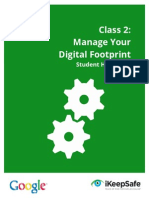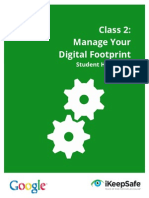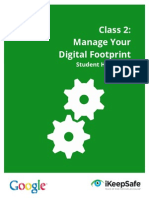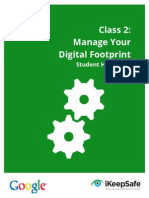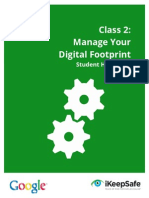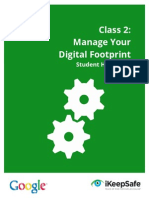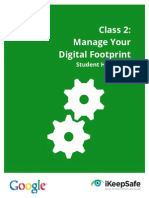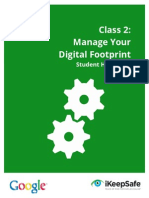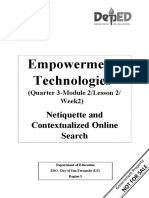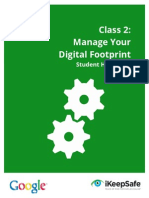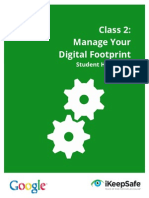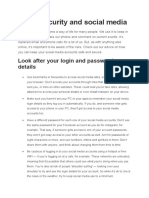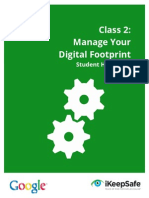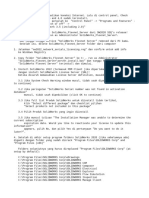Protecting Your Online Identity
Uploaded by
Lula DolabaratzProtecting Your Online Identity
Uploaded by
Lula DolabaratzGenerated by Foxit PDF Creator Foxit Software http://www.foxitsoftware.com For evaluation only.
Handout 2 A- Work in pairs and answer these questions: What is online identity? Have you got an online identity? Is it different from your real life identity? B- Read the article below.
PROTECTING YOUR ONLINE IDENTITY
Ashley is a high-school junior in Illinois. She's very careful about the information, photos, and comments she sends and posts even though her profile is set to private. She knows that nothing is ever really private online. "I know teens who have gotten kicked off their sports teams because of pictures and inappropriate material they have on their profiles," she says. Her advice is simple: "Be smart about what you put on the Internet, because you never know who is looking at what you have on there." From the first time you log on to a social networking site, pick a screen name for instant messaging (IM), or post to a blog on your favorite band, you're creating an online identity. Your online identity may be different from your real-world identity the way your friends, parents, and teachers think of you and some parts of it may be entirely made up. Maybe you're a little shy in real life, but online you're a jokester and your avatar is a famous comedian. Maybe your classmates think of you as a soccer star, but online you indulge your passion for chess and environmentalism. Playing around and trying on different characteristics are part of the fun of an online life. You can change your look or the way you act and present yourself to others, and you can learn more about things that interest you. And, just as in real life, you can take steps to help make sure you stay in control. Things to Consider Here are some things to consider to safeguard your online identity and reputation: Nothing is temporary online. In the virtual world there are thousands of opportunities to interact and share with people around the world. It's also a place where nothing is temporary and there are no "take-backs." A lot of what you do and say online can be retrieved even if you delete it and anyone can copy, save, and forward your information. Mark your profiles as private. Anyone who can see your profile on a social networking site can copy or screen-capture information and photos that you may not want the world to see. Don't rely on the site's default settings. Set up your privacy options to keep your material private. Safeguard your passwords and change them frequently. If someone logs on to a site and pretends to be you, they can trash your identity. Pick passwords that no one will guess (don't use your favorite band or your dog's birthday), and change them often. Never share them with anyone other than your parents or a trusted adult. Not even your best friend, boyfriend, or girlfriend should know your private passwords! Don't respond to inappropriate requests. Lots of teens receive inappropriate messages and solicitations when they're online. These can be scary, strange, and even embarrassing. If you feel harassed by a stranger or a friend online, tell an adult you trust immediately. It is never a good idea to respond. You can report inappropriate behavior or concerns atwww.cybertipline.org Think before you write. If youre angry enough to make a nasty comment on a message board or blog, it's a good idea to wait a few minutes, calm down, and remember that the comments may stay there for ever. You might feel anonymous or disguised in chat rooms, social networks, or other sites so you can think you can make mean, insulting, or abusive comments to others, or share pictures and comments you may later regret. A good rule to remember: if you wouldn't say it, show it, or do it in person, you probably don't want to online.
Generated by Foxit PDF Creator Foxit Software http://www.foxitsoftware.com For evaluation only.
Check yourself. Maybe, youve aready checked your "digital footprint" nearly half of all online users do. Type your screen name or email address into a search engine and see what comes up. That's one way to get a sense of what others see as your online identity. Take it offline. In general, if you have questions about the trail you're leaving online, don't be afraid to ask a trusted adultto help you.
Your online identity and reputation are shaped in much the same way as your real-life identity, except that when you're online you don't always get a chance to explain your tone or what you mean. Thinking before you post and following the same rules for responsible behavior online as you do offline can help you avoid leaving an online identity trail you regret. Reviewed by: Steven Dowshen, MD http://kidshealth.org/teen/safety/safebasics/online_id.html#
C- Vocabulary Look at the highlighted words in the text. Match them to their definition.
an internet forum invented _________________________ _________________________
hiding your identity take action, do something about found, extracted display in a public place internet nickname remove, erase feel repentance Destroy Deliver Send
_________________________
_________________________ _________________________
_________________________
_________________________ _________________________ _________________________
Settings not specified by the user (x defecto) Tormented by cosntant intimidation or interference Retractions marks or signs you leave as you move put into a specified state
_________________________
_________________________ _________________________ _________________________ _________________________
_________________________
programmes that search information using key words A copy of what you see on a screen Enter a site Protect
_________________________
_________________________
_________________________ _________________________ _________________________
An icon representing a person in cyberspace
_________________________
_________________________
A personal website to record thoughts, Opinions, etc. on a regular basis
_________________________
Generated by Foxit PDF Creator Foxit Software http://www.foxitsoftware.com For evaluation only.
D1. 2. 3. 4. 5.
Comprehension How does Ashley protect her online identity? What is her advice? When do you create your onlineID? Does your online ID have to be the same as your real life ID? How can you protect yours? Name 4 tips you think are most important.
E- Grammar: Giving Advice
When we think something is a good idea, or the right thing to do we use
You SHOULD PROTECT your online ID
should Shouldnt
When we think something is not a good idea or the right thing to do we use
Mary SHOULDNT POST nasty comments on other peoples photographs
SHOULD(NT) + VERB
Read the text again and fill in the chart below .
Its a good idea
Its not a good idea
Imagine one of your friends is having with his / her digital ID an online reputation. Give him / her some advice.
Generated by Foxit PDF Creator Foxit Software http://www.foxitsoftware.com For evaluation only.
You might also like
- Marcossesmas Digital Citizenship Lesson 2No ratings yetMarcossesmas Digital Citizenship Lesson 211 pages
- Security Issues Related To Social MediaNo ratings yetSecurity Issues Related To Social Media49 pages
- Santos Julian Digital Citizenship Lesson 2No ratings yetSantos Julian Digital Citizenship Lesson 211 pages
- Barrios Kelly Digital Citizenship Lesson 2No ratings yetBarrios Kelly Digital Citizenship Lesson 211 pages
- Flores Christiana Digital Citizenship Lesson 2No ratings yetFlores Christiana Digital Citizenship Lesson 211 pages
- That's Right, Well Done! You Sure Know How To Keep Your Online Identity SafeNo ratings yetThat's Right, Well Done! You Sure Know How To Keep Your Online Identity Safe5 pages
- Lopezandrew Digital Citizenship Lesson 2No ratings yetLopezandrew Digital Citizenship Lesson 211 pages
- General Tips On Using Social Networking Platforms Safely-CyberNo ratings yetGeneral Tips On Using Social Networking Platforms Safely-Cyber5 pages
- Perez Juan Digital Citizenship Lesson 2No ratings yetPerez Juan Digital Citizenship Lesson 211 pages
- Ramirezalberto Digital Citizenship Lesson 2No ratings yetRamirezalberto Digital Citizenship Lesson 211 pages
- Cruz Escarlet Digital Citizenship Lesson 2No ratings yetCruz Escarlet Digital Citizenship Lesson 211 pages
- Flores Eduardo Digital Citizenship Lesson 2No ratings yetFlores Eduardo Digital Citizenship Lesson 211 pages
- Trejo Aaliyah Digital Citizenship Lesson 2No ratings yetTrejo Aaliyah Digital Citizenship Lesson 211 pages
- Digital Citizenship Lesson 2 RenemonroyNo ratings yetDigital Citizenship Lesson 2 Renemonroy11 pages
- Empowerment Technologies: Netiquette and Contextualized Online SearchNo ratings yetEmpowerment Technologies: Netiquette and Contextualized Online Search17 pages
- 248 Computerscience2002202317372137 20022023053721602 1No ratings yet248 Computerscience2002202317372137 20022023053721602 120 pages
- Analytical Solutions For The Response of SSB Under Bidirectional Moving Random LoadsNo ratings yetAnalytical Solutions For The Response of SSB Under Bidirectional Moving Random Loads17 pages
- UMT 08 - PT 658 Critical Assessment 4.22.2022No ratings yetUMT 08 - PT 658 Critical Assessment 4.22.202212 pages
- Scaling Data - Data Informed To Data Driven To Data Led - ReforgeNo ratings yetScaling Data - Data Informed To Data Driven To Data Led - Reforge16 pages
- Senate Vs Ermita - G.R. 169777, April 20, 2006No ratings yetSenate Vs Ermita - G.R. 169777, April 20, 20062 pages
- Recruitment and Selection Process at DSCLNo ratings yetRecruitment and Selection Process at DSCL51 pages
- Sheet (1) - Electrical Power System-Transmission LineNo ratings yetSheet (1) - Electrical Power System-Transmission Line2 pages
- Types of Stairs Used in Building ConstructionNo ratings yetTypes of Stairs Used in Building Construction10 pages
- Diesel Fuel Oil System Commissioing ProcedureNo ratings yetDiesel Fuel Oil System Commissioing Procedure34 pages
- Solutions For Urban Drainage Systems Pitch DeckNo ratings yetSolutions For Urban Drainage Systems Pitch Deck40 pages
- Sutton Foster - Bring Me To Light - New York City Center DigitalNo ratings yetSutton Foster - Bring Me To Light - New York City Center Digital17 pages
- Ch-11 NC CNC DNC FMS Automation and RoboticsNo ratings yetCh-11 NC CNC DNC FMS Automation and Robotics143 pages
- Week 3-Chapter 4 Long Term Financial Planning and Growth100% (1)Week 3-Chapter 4 Long Term Financial Planning and Growth18 pages
- Your Digital Footprint Password Protection RequirementsFrom EverandYour Digital Footprint Password Protection Requirements
- That's Right, Well Done! You Sure Know How To Keep Your Online Identity SafeThat's Right, Well Done! You Sure Know How To Keep Your Online Identity Safe
- General Tips On Using Social Networking Platforms Safely-CyberGeneral Tips On Using Social Networking Platforms Safely-Cyber
- Empowerment Technologies: Netiquette and Contextualized Online SearchEmpowerment Technologies: Netiquette and Contextualized Online Search
- 248 Computerscience2002202317372137 20022023053721602 1248 Computerscience2002202317372137 20022023053721602 1
- Analytical Solutions For The Response of SSB Under Bidirectional Moving Random LoadsAnalytical Solutions For The Response of SSB Under Bidirectional Moving Random Loads
- Scaling Data - Data Informed To Data Driven To Data Led - ReforgeScaling Data - Data Informed To Data Driven To Data Led - Reforge
- Sheet (1) - Electrical Power System-Transmission LineSheet (1) - Electrical Power System-Transmission Line
- Sutton Foster - Bring Me To Light - New York City Center DigitalSutton Foster - Bring Me To Light - New York City Center Digital
- Week 3-Chapter 4 Long Term Financial Planning and GrowthWeek 3-Chapter 4 Long Term Financial Planning and Growth










